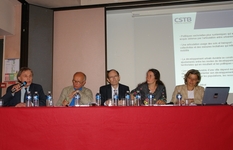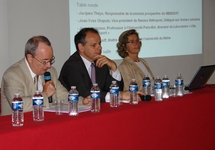Sustainable towns: an approach, the first elements of answers

This book was written by CSTB research workers under the leadership of Lydie Laigle, and was published by Éditions PUCA-CERTU in early 2009. The authors base their work on experiments in Barcelona, Hanover, Naples and Copenhagen, to demonstrate that there is no single model of a sustainable town. "Durability is an approach, not a state!, emphasized Emmanuel Raoul, Permanent Secretary of the PUCA (Town Planning, Construction and Architecture Plan) in his introduction to the presentation. Each urban area had its specific heritage and adapted itself to development challenges, applying urban forms and specific measures that the book attempts to describe, while highlighting the limits.
Common problems
"Even so, the analysis highlights common problems, explained Lydie Laigle. Thus in all four examples, public action has to face urban forces (competition between communes), market pressures (land, real estate), localisation logic and travel habits." The question of appropriate governance in organising sectorial policies also arises everywhere. The objective is to give priority to durability, but to achieve this, how should the interplay between communities (region, intercommunities, town hall, etc.) be organised? Should priority be given to bottom-up or top-down approaches? What weight should be assigned to regulations, concertation, incentives, so as to modify localisation and travel logic?
A systemic approach
Urban areas have set up new more systemic policies beyond essential planning, integrating energy problems into previously organised policies for town planning, regional development and transport. The authors believe that sustainable urban development is a long-term goal, and is achieved by making adjustments between economic and urban development modes, regional developments resulting from them and the policies that guide them. "We fully agree with the benefits of a systemic approach, says Cyria Emelianoff, Conference master at the University of Maine. This is a genuine approach, particularly in France where everything is closely partitioned. The relation between urban development and planning of transport systems is one of the main themes in the book."
The role of politicians
"Relations between town planning and transport form one of the factors of success, confirmed Jean Laterrasse, Professor at Paris-East University, Director of the "Town Mobility Transport" laboratory. But the influence of some players and their ecological sensitivity is also important: a few people make continuous efforts for the ecology". According to Jean-Yves Chapuis, Vice-President of the Rennes Metropolitan Region, Delegate to urban forms, it is important not to neglect agriculture which remains a key point in suburban development, if only for health aspects. Furthermore, he continues, "some changes in society need to be considered: the lifestyle of single person households, longer life expectancy and related new needs, new forms of travel such as car sharing, etc. ", with consequences on residential and land use policies. Faced with such a variety of demands from society, politicians must once again become independent and fulfil their role as referees.
What scale ?
Also on this question on governance, Jacques Theys, Manager of the MEEDDAT (Ministry of Ecology, Energy, Sustainable Development and Regional Development) prospective Mission, repeated that all towns are faced with problems of the scale at which sustainable development decision should be made. "At the moment, perhaps it is no longer enough to work at the scale of built-up areas, maybe we should be talking about sustainable urban regions?" With the risk mentioned by Jean Laterrasse, of extending urban sprawl beyond this region.
"The sustainable nature of a town depends less on its intrinsic characteristics than on its capability to guide its development and limit the damaging effects that it generates on populations, resources and life styles ", said Lydie Laigle in conclusion.


